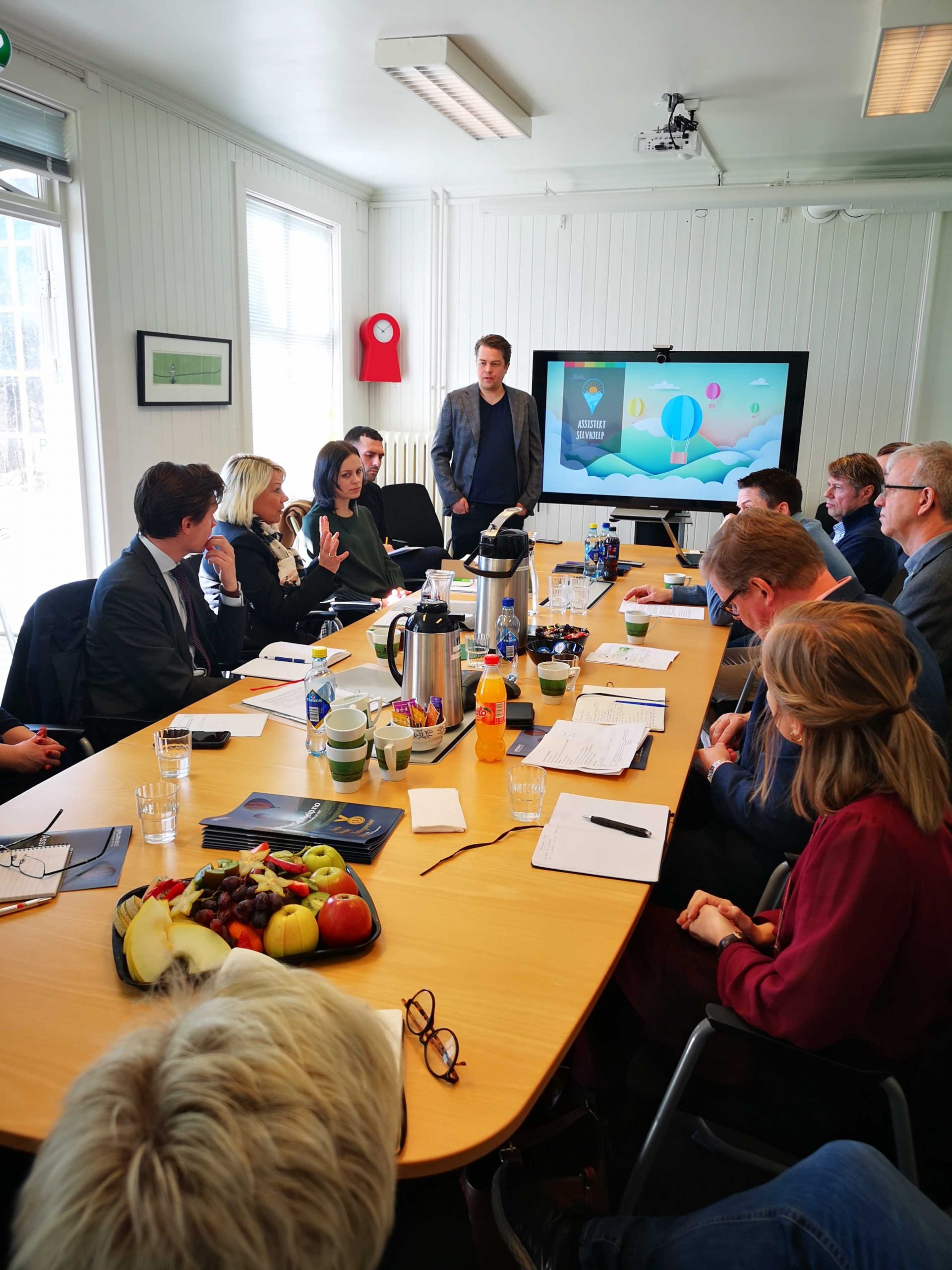Increased treatment capacity through own efforts
Minister Monica Mæland visited Kristiansand on Monday 25 March. Together with parts of the staff in the ministry, she now travels around the country to listen to experiences with innovation in the public sector. It is exciting to hear about good examples of public-private collaboration. As Minister for Business, I presented the first report to the Storting on entrepreneurship, so I have a big heart for entrepreneurs, introduced Mæland.
Innovation in the field of mental health was on the agenda when psychologist and entrepreneur Oskar Blakstad presented Assisted self-help to the Prime Minister on the initiative of the ministry. Blakstad was supplemented by Clinic Manager Oddvar Sæther and psychiatrist Terje Thesen from Sørlandet Hospital. Internet processing has for several years been part of the "Mind the Gap" project collaboration between Sørlandet Hospital and Kristiansand Municipality.

Satisfied users
One of the projects presented dealt with chest pain. - The background for the chest pain project is that there is a large group of patients who are examined for chest pain every year at the hospital, without finding a specific cause for the pain in most cases. Of these, close to half will continue to have significant complaints afterwards, leading to a reduced quality of life and a large consumption of healthcare services. As of today, there is no standard offer for these, although previous studies have shown that face-to-face follow-up can be useful, according to Thesen.
Ivar has been a participant in the chest pain project, and tells about good experiences and life-changing treatment when he was offered internet-supported follow-up by senior doctor Thesen.

-It started when I sometimes contacted the GP due to diffuse discomfort in the chest. The doctor's response was that this should be examined via EKG, Ivar said. It was also commented that if such discomfort persists I should call 113. In order to get a proper investigation, I was encouraged to have a more thorough check at Sørlandet hospital. Everything looked fine there. The positive thing about these difficulties was that I was offered to join this project which consisted of some follow-up together with Internet treatment. This involved carrying out daily physical activities, which required me to push myself and get my heart rate up. This was the opposite of what I had previously done, as it increased the discomfort and the fear that this would lead to an overload. I learned that the body tolerated the loads just fine, and started with stable increased daily activity, which I would not have otherwise carried out. I am grateful that I received this offer, which has led to a more active life, better fitness and the experience of clearly improved general health, explained Ivar enthusiastically.

Can help more people
The Institute of Public Health estimates that 1 in 5 of the adult population has a mental disorder at any time, and the need for treatment is far greater than the capacity of the healthcare system.
- Those affected by mental disorders are ordinary people with ordinary challenges. The treatment gap is as much as 50 %. This means that half of those who need treatment are without an offer, explained Blakstad.
Assisted self-help is based on the "Guided self-help" method, where healthcare personnel follow up a course of treatment with a focus on the user performing health-promoting activities.
-Assisted self-help does not replace health personnel, but strengthens the health service's capacity to offer treatment. The need is far greater than the capacity, and this means that tens of thousands do not get access to known and effective treatment for common disorders such as anxiety and depression. This costs society enormous sums, and there is a solution, said Blakstad to an engaged Minister of State, who also brought along Kristiansand's mayor Harald Furre.
- With the use of Assisted Self-Help, the health service can treat more patients equally effectively, and provide earlier help. We already reach many, but hope to reach even more in the future, both in Norway and abroad, says Blakstad.
Easy to implement
- There are a large number of patients with mild to moderate mental disorders who are not entitled to an offer in the specialist health service, but who could benefit from more follow-up than is currently available. Milder mental disorders entail large societal costs in themselves and can develop into more serious conditions that are more difficult to treat, said Thesen. In the "Mind the gap" project, selected GPs are given the opportunity to offer various internet-assisted programs to users with mild to moderate mental disorders. The project was assessed as successful and the steering group has decided that the project will continue as a collaborative project between the municipality and KPH.
- The reason why our research group is concerned with internet-assisted treatment is that it is inexpensive, easy to implement, and can be used regardless of geographical conditions. Internet-assisted treatment that proves to be effective can help even out differences in the offer provided, claims Thesen.



